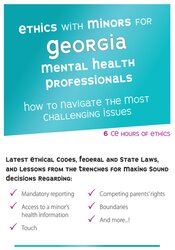
- Stories
- Magazine
- CE Training
- Symposium
- More

Those of us who treat minors and their families experience a flood of emotions. There is confusion over changing ethical codes and laws, fear that the actions that we take will lead to long-term developmental damage, and anxiety that at any moment we might unintentionally cross a line that could jeopardize our professional license and put us in legal peril. In this environment, we can find ourselves impaired in our ability to function as professionals and help our clients.
Combining a step-by-step guide to an effective decision-making model, the most updated ethical codes and legal statutes, and lessons from 30 years as a clinician and ethics professor, Terry Casey, PhD, HSP will give you a solid foundation for evaluating the ethical options when working with minors and their families. You will have much more confidence about the course of action you take involving mandatory reporting, access to minors’ records, parental rights, boundary issues, touch, and others.
This self-study activity includes 6.0 hours of State specific ethics instruction. Not all boards allow ethics credit for self-study products. If ethics is not specified within your licensing board’s approval statement below, please contact your board to determine the applicability and amount of ethics allowed.
This self-study activity consists of 6.25 clock hours of continuing education instruction. Credit requirements and approvals vary per state board regulations. Please save the course outline, the certificate of completion you receive from the activity and contact your state board or organization to determine specific filing requirements.
PESI, Inc. is approved by the American Psychological Association (APA) to sponsor continuing education for psychologists. PESI, Inc. maintains responsibility for this program and its content. PESI, Inc. is offering these self-study materials for 6.0 hours of continuing education credit. Course Level: Intermediate.
This self-study activity consists of 6.25 clock hours of continuing education instruction. Credit requirements and approvals vary per state board regulations. Please save this course outline, the certificate of completion you receive from this self-study activity and contact your state board or organization to determine specific filing requirements.
This self-study course has been approved by PESI, Inc., as a NAADAC Approved Education Provider, for 6.0 CE in the Legal, Ethical and Professional Development skill group(s). NAADAC Provider #77553. PESI, Inc. is responsible for all aspects of their programming. Full attendance is required; no partial credit will be awarded for partial attendance.
This self-study activity qualifies for 6.25 continuing education clock hours as required by many national, state and local licensing boards and professional organizations. Save your activity advertisement and certificate of completion, and contact your own board or organization for specific requirements.
| File type | File name | Number of pages | |
|---|---|---|---|
| Manual - Ethics with Minors for Georgia Mental Health Professionals (2.6 MB) | 151 Pages | Available after Purchase |

TERRY CASEY, PhD, is a licensed psychologist, HSP health service provider with over 30 years of professional experience, including a 16-year tenure as the director of counseling & psychological services for a non-profit agency with over 30 counselors at over a dozen locations. He is in private practice in Franklin Tennessee, teaches ethics and professional issues in counseling at Lipscomb University’s graduate program in clinical mental health counseling, and guest lectures at Trevecca Nazarene University’s PhD program in Clinical counseling. Dr. Casey also served for several years as the chair of the ethics committee for the Tennessee Licensed Professional Counselors’ Association and in an advisory capacity for graduate counseling programs at two universities. He has presented frequently on ethics to organizations such as the American Counseling Association, the Tennessee Licensed Professional Counselors Association, the Nashville Area Association of Christian Counselors, and others. For more information, visit his practice website at rencounselingtn.com.
Speaker Disclosures:
Financial: Dr. Terry Casey maintains a private practice and is a faculty member of Lipscomb University. He is a published author and receives royalties. Dr. Casey receives a speaking honorarium and recording royalties from Psychotherapy Networker and PESI, Inc. He has no relevant financial relationships with ineligible organizations.
Non-financial: Dr. Terry Casey is a member of the American Psychological Association, the Tennessee Psychological Association, the Tennessee Licensed Professional Counselor Association, and others. For a complete list, please contact info@pesi.com.
Access never expires for this product. For a more detailed outline that includes times or durations of time, if needed, please contact cepesi@pesi.com.
| 5 |
|
| 4 |
|
| 3 |
|
| 2 |
|
| 1 |
|
Satisfaction Guarantee
Your satisfaction is our goal and our guarantee. Concerns should be addressed to: PO Box 1000, Eau Claire, WI 54702-1000 or call 1-800-844-8260.
ADA Needs
We would be happy to accommodate your ADA needs; please call our Customer Service Department for more information at 1-800-844-8260.
Please wait ...